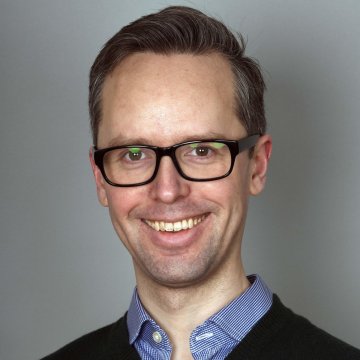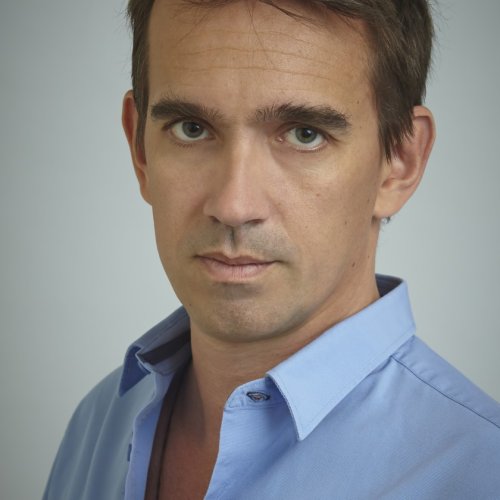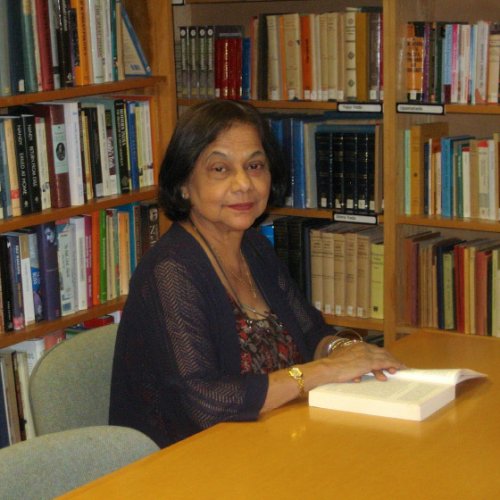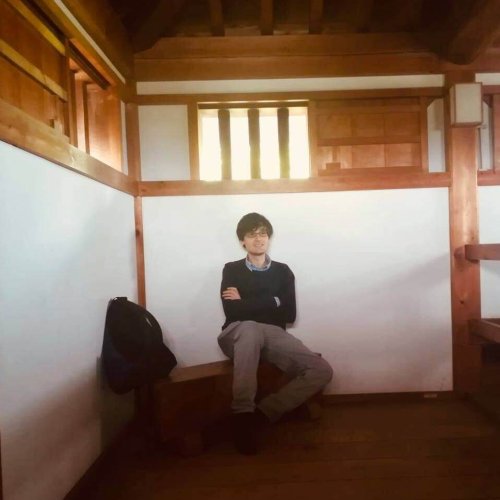Member Profiles
In this section are profiles of some of our Fellows. Find out more about their interests in Asia and what they have to say about the Society.
In this section are profiles of some of our Fellows. Find out more about their interests in Asia and what they have to say about the Society.

Adrian Plau is Manuscript Collections Information Analyst at Wellcome Collection, and a recent Headley Fellow with the Art Fund. He holds a PhD in South Asia Studies from SOAS.
How did you first hear of the Society?
I first heard of it at a student event when I was doing my PhD at SOAS and ended up joining as a student member simply out of curiosity. Sadly, I only went to one single event during my PhD studies, but it was very memorable and, as an international student in the UK, rather exotic. I’d never before heard anyone unironically use the phrase ‘these British isles’ in conversation. I was fascinated then, and I still am, and as I’ve stayed on in the UK to live and work here, the Society has evolved to be a point of constancy for me professionally.
What encouraged you to join?
I realised the many benefits of being a member, from having access to the Journal and the many ongoing events to the use of the library, and I was very happy to continue from my student membership to a full Fellowship.
What would you say are the benefits of being a fellow of the RAS?
I’ve found that the Journal brings insights and information that I make use of in my day-to-day work. It is one of the only academic journals I find myself reading from beginning to end.
What is your favourite item from the RAS collections?
As I now work as a collections professional dealing with collections management and cataloguing, I’d like to highlight the phenomenal work the RAS team is doing to make these collections searchable, discoverable, and accessible in the first place. As far as I understand it’s not a very big team at all and they’re dealing with a very extensive and complicated collection – seeing what they’ve managed to accomplish with the online catalogue simply blows me away.

Cheryl Porter is Director of the Montefiascone Project Summer School in Italy. She was Head of Conservation and Deputy Director of the Thesaurus Islamic Foundation and National Library of Egypt Islamic manuscript conservation project. Her speciality is the history of colours used to paint in manuscripts – Islamic, Western and Hebrew. She has taught workshops and lectured in the UK, throughout Europe, the Middle East, the USA, and Australia. She has published extensively on topics such as conservation science, manuscript conservation and the history of colour. She is a Professional Associate in the American Institute for Conservation of Historic and Artistic Works.
How did you first hear of the Society?
I knew of the Society for some time and had visited the previous premises, but didn’t join until its relocation to Stephenson Way in 2006.
What encouraged you to join?
I joined in order to have access to the library and its extraordinary manuscript collections.
What would you say are the benefits of being a fellow of the RAS?
The main benefits for me are access to the RAS library collections, but equally useful are the lectures, which are now much more accessible with digital facilities so I can listen to them from wherever I am, or find them on the Society’s website. The RAS has always been very generous in allowing me to use images from their collections for my lectures and publications.
What is your favourite item from the RAS collections?
The manuscripts, especially the Persian and South Asian.

Peter Frankopan is Professor of Global History and Director of the Oxford Centre for Byzantine Research. He is also UNESCO Professor of Silk Roads Studies at King’s College, Cambridge. He read History at Jesus College, Cambridge before doing his doctorate at Corpus Christi College, Oxford where he was Senior Scholar. He came to Worcester as a Junior Research Fellow in 1997 and has been Senior Research Fellow since 2000.
Peter has been named as one of the World’s 50 Top Thinkers (Prospect), ‘the rockstar historian du jour’ (Sunday Times) and the ‘first great historian of the 21st century’ by Brazil’s DCM magazine. Peter works with multi-lateral institutions including the World Bank, the Asian Development Bank, UNESCO, UNIDO and wrote post-pandemic recovery plans for group of governments in Asia. He is currently working on a major history of environmental and climatic change.
Peter works on the history of Byzantium, Russia, Ukraine, the Middle East, Iran, Central and South Asia and China. His book The First Crusade: The Call from the East (2012) was described as ‘overturning a millennium of scholarship’ and the most significant contribution to rethinking the origins and course of the First Crusade for a generation.’
His book, The Silk Roads: A New History of the World (2015) was Sunday Times Book of the Decade, New York Times Bestseller and topped the non-fiction charts in the UK, UAE, India, China and beyond. It was described as ‘magnificent’ (Sunday Times) ‘ dazzling’ (Guardian), ‘a rare book that makes you question your assumptions about the world’ (Wall St Journal), ‘a treasure’ (Libre Belgique), ‘phenomenal’ (Die Welt), ‘a joy’ (Le Point) and ‘not just the most important history book in years, but the most important in decades’ (Berliner Zeitung). It was named one of the 25 most important books translated into Chinese of the last forty years, alongside Pride and Prejudice and The Great Gatsby.
His most recent book is The Earth Transformed: an Untold History which looks at the natural environment and the role it has played in shaping the past. An instant bestseller in the UK, Australia, the Netherlands, Canada and Germany, it has been described as ‘a mighty history….an endlessly fascinating book’ with the ‘the intellectual weight and dramatic force of a tsunami’ (The Times), ‘masterly’ (Observer), ‘a dazzling compendium of global research’ (Spectator), ‘an epic historical saga’ (TLS) ‘a staggering, almost insanely ambitious book’ (Volkskrant) and ‘a remarkable piece of work’ (New Indian Express). It is ‘a completely new view of the history of mankind, which sheds a different light on our own future’ (Die Zeit), one that blends ‘brilliant historical writing and cutting-edge scientific research’ (Arab News). ‘Humanity has transformed the Earth’ said the Financial Times, ‘Frankopan transforms our understanding of history.’
How did you first hear of the Society?
I’d known about the Royal Asiatic Society since I was a student as I was interested in how British and British-based scholars in the 19th and 20th centuries made sense of the world that was opening up to them. I came across the name again and again (and again). I didn’t give too much thought to what the RAS does in the contemporary world, so it was only later that I put two and two together.
What encouraged you to join?
Joining any society does three things. First, it enables the RAS to stay alive and to grow. Annual subscription fees are so important to keep organisations going. Second, it is a joy to be a new member, partly because societies need new faces, new ideas and new people to leave, breathe and keep moving. So I thought there was almost an obligation to join and to help the membership keep growing. And finally, my own work and interests cross over with so many other members of the RAS. Being part of something where one can share new research, listen to brilliant people present their work, and learn about things one knows little about or learn more about things that one does is a complete joy.
What would you say are the benefits of being a fellow of the RAS?
I love everything the RAS does – from lectures to events, from the prizes it awards to the encouragement and support it gives to young scholars. But my top answer is the Journal of the Royal Asiatic Society (JRAS). I am genuinely excited when it pops through the letter box ! I’ve learned so much from the journal over the years – both reading it in print and online. The range and quality of the articles is just breath-taking, so impressive and so interesting.
What is your favourite item from the RAS collections?
I’ve always had a soft spot for maps – even though maps over-simplify, can be misleading and can sometimes even stand in the way of improving our knowledge. But I love them despite all that, both as sources that try to convey information and also as objects that are very revealing about their makers, their aims and intentions. The RAS has a fantastic collection. I love the Ottoman railway map (and the blog by Philip Jagessar) dating to 1904. It is so evocative about a world going through a whole series of transitions – and of course the significance of rail travel has a particular resonance in the tail-end of the Ottoman empire. But ask me again next year, and I’d doubtless pick something else !

Julia A. B. Hegewald is Professor of Oriental Art History and Head of the Department of Asian and Islamic Art History at the University of Bonn, Germany. She was Reader in Art History at Manchester (2007–2010), a postdoctoral Fellow at the South Asia Institute in Heidelberg (2005–2007) and a Research Fellow at University College Oxford (1998–2005). She studied at the School of Oriental and African Studies (SOAS), London, from where she also holds a Ph.D.
How did you first hear of the Society?
I first heard of the Society and attended a number of lectures there while I was a student at SOAS in the early 1990s.
What encouraged you to join?
When I was awarded my PhD at SOAS in 1998, my supervisor, Dr. Giles H.R. Tillotson, who had been a fellow for many years, encouraged me to apply in order to meet more scholars from the field of Asian Studies and to participate in the activities of a learned society focusing on Asia.
What would you say are the benefits of being a fellow of the RAS?
The most important benefit for me is that fellows get invited to an enormous number of high-quality lectures and events, organized by the Society. Since the Corona pandemic, most of the lectures can also be accessed digitally, which is wonderful as it allows members living and researching abroad to participate as well. Additionally, I really appreciate receiving the RAS Journal four times a year and staying up-to-date with current research.
What is your favourite item from the RAS collections?
Besides my interests in South Asian water architecture, city planning and Himalayan arts, I have been working on Jaina art and architecture for many years. For this reason, I am particularly fond of Jambudvipa (RAS 069.001), a cosmological painting on cloth from Western India (ca. 1817), which shows a Jaina religious perception of the world of man.

Rosane Rocher is a Sanskritist and a historian of Indology, and a Professor Emerita of South Asia Studies at the University of Pennsylvania, where she served as department chair, director of the National Resource Center for South Asia, and founding director of the Program in Asian American Studies. She and her husband, Ludo Rocher, the late W. Norman Brown Professor Emeritus of South Asia Studies at the same institution, were jointly awarded the 2015 prize of the Fondation Colette Caillat of the Institut de France “for their latest two joint books, The Making of Western Indology: Henry Thomas Colebrooke and the East India Company (2012) and Founders of Western Indology: August Wilhelm von Schlegel and Henry Thomas Colebrooke in Correspondence 1820–1837 (2013), and for their lifelong, signal contributions to Sanskrit studies and the history of Indology.” She is currently the president of the Ludo and Rosane Rocher Foundation, which fosters American scholarship on classical Indology.
How did you first hear of the Society?
I cannot recall how and when I first heard of the Society. It was an inherent part of my veering from western Classics to Indology as a double M.A. student and Ph.D. candidate at the Free University of Brussels in my native Belgium. The first time I had an active engagement with the Society was when I conducted research for my first biography of an Indologist, Alexander Hamilton, who was an original member of the Society.
What encouraged you to join?
Colebrooke! Kit Naylor, a pillar of the RAS and a descendant of its founder, H.T. Colebrooke, sought advice from fellow members of the Society about a scholar who might examine Colebrooke’s papers in his possession and evaluate their potential interest. I was the happy recipient of his invitation. My husband, an admirer of Colebrooke’s work on Hindu law, who had long wondered where the Colebrooke family papers might be, was as enthusiastic as I was. To us, they were manna from heaven! Kit put the papers on temporary deposit at the RAS so that I might examine them at leisure. I spent a summer going through them at the Society, then in Queen Anne Street, where I became acquainted with the staff and visitors. The Society became a living entity, which it was natural I joined.
What would you say are the benefits of being a fellow of the RAS?
For an overseas member like me, the RAS is a port-of-call, to which I pay a visit every time I am in London, even when no project of mine requires it. From a distance, its lectures (now on Zoom), its journal, and other publications keep me informed of scholarly trends in the UK. I also believe that it behoves scholars of Asia to support and expand the continuing mission of the RAS. The Society is at a point of inflection. The last generation of returned colonial servants who constituted most of its initial membership is dwindling. At the same time, increased global mobility has fostered in the UK the growth of generations of people who maintain an interest in the histories and cultures of their Asian forebears.
What is your favourite item from the RAS collections?
The Archives, every little bit of them! Since the Colebrooke biography, I have had occasion repeatedly to consult them for my latest biographies of Indologists, For the Sake of the Vedas: The Anglo-German Life of Friedrich Rosen 1805–1837 (2020) and A shunned Indologist: Ludwig Poley 1805–1885 (in final draft). The RAS staff has been of wonderful support, responding to queries and keeping scholarship served during the Covid-19 pandemic.
Ludo and Rosane Rocher Foundation
www.rocherfoundation.org

Tim’s books include a travel trilogy pursuing the fourteenth-century wanderer, Ibn Battutah, around three continents, as well as editions and translations of early Arabic texts. His 2019 volume, Arabs: A 3,000-Year History of Peoples, Tribes and Empires, written in a period of forced immobility during the Yemeni civil war, examines the past through the lenses of language and migration; it has been described as ʻa book of vast scope and stunning insightʼ.
Among other documentaries, Tim presented and co-wrote the major BBC TV series Travels with a Tangerine. He is an emeritus Senior Fellow of the Library of Arabic Literature.
I grew up surrounded by books, many of them books of travels. Even before I could read, I was fascinated – who wouldn’t be? – by engravings and photographs of places east. I went to a school that had produced the likes of Francis Younghusband, and on to the university college from which Richard Burton had been expelled (he galloped out, shocking the dons, over the hallowed lawns). Arabic studies took me to Yemen, and there I stayed, using it as a base for my own travels. I had the good fortune to bump into some of the then still living legends of Arabian travel: Wilfred Thesiger and his desert travelling companions from the 1940s; Doreen Ingrams, the unsung doyenne of Arabian exploration. My first four books were published by a firm with a distinguished Asiatic line of authors that led from Alexander Burnes to Freya Stark. I can’t remember when I first heard of the Society. But how could I not have done?
I needed no encouragement to join. The catalyst for doing so was giving a talk for the Society (on Ibn Battutah, that great fourteenth-century explainer of Asia to the west) on one of my rare visits to London. I am still rarely in the UK, so am only an occasional visitor to Stephenson Way. But, as one of those endangered creatures, an independent scholar, membership gives me a sense of affiliation – not only to a living body of thinkers, but to a whole tradition that I’m proud and honoured to belong to. And there are practical benefits for a peripatetic Fellow. I have, for example, turned up at the RAS in Colombo, and gained access not just to a library but also to the welcome of other scholars and a whole series of doors opening unexpectedly across the island.
If I have a favourite item in the Society’s collections, it may well be the manuscript of the eighth volume of al-Hamdani’s Iklil, a small but rich tenth-century description of Yemen’s antiquities. Among many other marvels, it describes in poetry the pre-Islamic palace of Ghumdan (‘physic for a care-worn heart’) in Sana’a, on the ruins of which stands my own house, and my own library, with its own copy of the Iklil. I hardly left the house during five years of war. For three, now, I haven’t been back there. But I know that manuscript would transport me back there instantly.

Mandakranta Bose is Professor Emerita at the University of British Columbia, Vancouver, where she taught Religion and Women’s Studies, and was for many years Director of the Centre for India and South Asia Research. Dr. Bose studied Sanskrit in Calcutta (BA, MA) and Oxford (MLitt, DPhil) and Comparative Literature at the University of British Columbia (MA), has numerous publications on Sanskrit textual studies, Indian epics, Hinduism, the performing arts, literature, and gender studies. She was elected Fellow of the Royal Asiatic Society of Great Britain and Ireland (1990), of the Royal Society of Canada (2007), and of the Oxford Centre for Hindu Studies (2013).
How did you first hear of the Society?
I heard of RAS in my teens in Calcutta in the mid 1950s from my father who was a professor of history at the University of Calcutta. RAS was also frequently mentioned in his academic circle and in cultural magazines.
What encouraged you to join?
I was attracted to RAS as a meeting place of Asianists, especially when encouraged by eminent scholars such as the late Bimal Krishna Matilal and Professor Richard Gombrich who very graciously nominated me.
What would you say are the benefits of being a fellow of the RAS?
Access to a rich collection of manuscripts and art from Asia, to exhibitions, and the opportunity to keep up with developing scholarship.
What is your favourite item from the RAS collections?
Mughal and Rajput miniature paintings.

Farouk Yahya is a Research Associate in the Department of History of Art and Archaeology, School of Arts, SOAS University of London. His research interests include the Southeast Asian arts of the book, as well as texts and images relating to magic and divination in Southeast Asia. He is the author of Magic and Divination in Malay Illustrated Manuscripts (Leiden: Brill, 2016), editor of The Arts of Southeast Asia from the SOAS Collections (Penang: Areca Books, 2017), and co-editor of Islamicate Occult Sciences in Theory and Practice (Leiden: Brill, 2021). His latest article is “Paper Wheels with Strings Used for Divination from Sumatra and the Malay Peninsula”, Manuscript Cultures 19 (2023): pp. 31-54 (https://fiona.uni-hamburg.de/4455bb49/mc19-farouk-gro.pdf).
How did you first hear of the Society?
I first heard of the Society while working on my PhD at SOAS on Malay manuscripts relating to magic and divination. It came to my attention that the Society houses an important collection of 19th-century Malay manuscripts. While delving into the Society’s collection, I discovered several remarkable manuscripts that became a crucial part of my research, and eventually found their way into the pages of my book, Magic and Divination in Malay Illustrated Manuscripts.
What encouraged you to join?
Choosing to become a member of the Society was a natural decision for me. Not only did I see it as an opportunity to contribute to its valuable efforts, but it also enabled me to connect with others who shared my interests in the history, culture and art of Southeast Asia.
What would you say are the benefits of being a fellow of the RAS?
I enjoy attending the lectures organised by the Society and receiving copies of its Journal, which have expanded my knowledge across diverse topics.
In addition there are also valuable financial benefits. Given my focus on the art historical aspects of the manuscripts, acquiring high-resolution colour images is vital for my research and publications. As a member I have the privilege of enjoying exclusive discounts when purchasing these essential images. Finally, I cannot speak highly enough of the Society’s warm and supportive staff, whose assistance throughout my research has been invaluable.
What is your favourite item from the RAS collections?
There are too many to list here, but particularly significant to me are the Malay manuscripts that were acquired by a British colonial officer, William Maxwell, during the late 19th century. They encompass a diverse array of subjects such as literature, history, religion and the occult sciences. Several are illuminated and illustrated, making them an important resource for the study of Malay art. I had initially examined them during my doctoral studies, and recently I found myself revisiting these same manuscripts once again, discovering previously unnoticed details that provide further insights on the Malay manuscript tradition.

Matteo Miele is an Assistant Professor at the Department of Political and Social Sciences of the University of Florence and an Affiliated Associate Professor at the Center for Southeast Asian Studies (CSEAS) of Kyoto University. Between August 2011 and July 2012, he was a Lecturer at the Sherubtse College, Royal University of Bhutan. He received his Ph.D. from the University of Pisa in 2014. He has been a Fellow of the Royal Asiatic Society of Great Britain and Ireland since 2011.
How did you first hear of the Society?
As a teenager, reading about the history of British India, the Royal Asiatic Society was constantly mentioned in books and articles. It was already a familiar presence.
What encouraged you to join?
I decided to submit the application while I was in Bhutan as a lecturer at Sherubtse College. The year before, I had started my doctorate at the University of Pisa on the history and institutions of Asia. After several years, personal interests in the world of Asian studies were more seriously shaping my academic path and my true professional goal. Joining the Society seemed like a natural step on this journey.
What would you say are the benefits of being a fellow of the RAS?
I am always happy and proud to be a fellow of the Royal Asiatic Society. It is an extraordinary world. When I had the opportunity to speak to the Society in the 2014 Student Series presenting my doctoral research, it was a precious moment in terms of studies, but also an opportunity to meet many scholars and students. It is a network of passionate, enthusiastic, and curious people. Exchanging ideas, advice, and information with them, even remotely, makes you feel part of a wonderful organization. When I meet or read about another fellow, even from the past, I immediately think “she/he’s one of us”.
What is your favourite item from the RAS collections?
The personal papers held by the Royal Asiatic Society are invaluable to a historian. Specifically, I hope in the future to find time to study the Papers of Alan Charles Trott carefully.